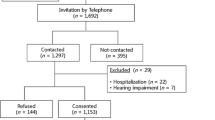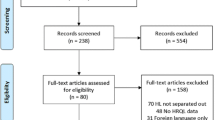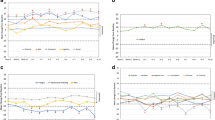Abstract
This study aimed to use an individual approach in evaluating QoL in long-term survivors of Hodgkin's lymphoma (HL) and their view of what impact the disease has had on life using an extended version of the The Schedule for the Evaluation of the Individual quality of life-Direct Weighting (SEIQoL-DW). Adult long-term survivors from HL (n = 121) were compared with a randomly selected sample of the general population in Stockholm (n = 236). The results showed that the most commonly nominated areas (>50% of patients and controls) important in life were family, personal health, work and relations to other people. The HL survivors mentioned leisure and finances less frequently than the controls. However, neither the current status in the different areas nor the QoL index score differed between survivors and controls. Thoughts and worries around disease, fatigue and loss of energy and late effects on skin and mucous membrane were the most commonly reported problems following HL. Sixty-six percent of the survivors reported a change in their view of life and of themselves. Demographic and disease characteristics did not influence the ratings of the chosen areas. In conclusion, long-term survivors of HL seem to have adapted well to the situation of having had a life-threatening disease and undergoing treatment, as measured with SEIQoL-DW. The extended Swedish version with a disease-specific module could be of great value when identifying specific issues that are important for the patient at time of evaluation.
Similar content being viewed by others
References
Swerdlow AJ, Barber JA, Hudson GV, et al. Risk of second malignancy after Hodgkin's disease in a collaborative British cohort: The relation to age at treatment. J Clin Oncol 2000; 18(3): 498–509.
van Leeuwen FE, Klokman WJ, Veer MB, et al. Long-term risk of second malignancy in survivors of Hodgkin's disease treated during adolescence or young adulthood. J Clin Oncol 2000; 18(3): 487–497.
Massie MJ, Holland JC. Overview of normal reactions and prevalence of psychiatric disorders. In: Holland JC, Rowland JH (eds), Handbook of Psychooncology, Psychological Care of the Patient with Cancer. New York: Oxford University Press, 1989; 273–282.
Stark DP, House A. Anxiety in cancer patients. Br J Cancer 2000; 83(10): 1261–1267.
Kornblith A. Psychosocial adaptation of cancer survivors. In: Holland JC (ed.), Psychooncology. New York: Oxford University Press, 1998; 223–254.
Joly F, Henry-Amar M, Arveux P, et al. Late psychosocial sequelae in Hodgkin's disease survivors: A French population-based case-control study. J Clin Oncol 1996; 14(9): 2444–2453.
Loge JH, Abrahamsen AF, Ekeberg O, Kaasa S. Reduced health-related quality of life among Hodgkin's disease survivors: A comparative study with general population norms. Ann Oncol 1999; 10(1): 71–77.
van Tulder MW, Aaronson NK, Bruning PF. The quality of life of long-term survivors of Hodgkin's disease. Ann Oncol 1994; 5(2): 153–158.
Bloom JR, Fobair P, Gritz E, et al. Psychosocial outcomes of cancer: A comparative analysis of Hodgkin's disease and testicular cancer. J Clin Oncol 1993; 11(5): 979–988.
Abrahamsen AF, Loge JH, Hannisdal E, et al. Sociomedical situation for long-term survivors of Hodgkin's disease: A survey of 459 patients treated at one institution. Eur J Cancer 1998; 34(12): 1865–1870.
Fobair P, Hoppe RT, Bloom J, et al. Psychosocial problems among survivors of Hodgkin's disease. J Clin Oncol 1986; 4(5): 805–814.
Kornblith AB, Herndon JE II, Zuckerman E, et al. Comparison of psychosocial adaptation of advanced stage 552 Hodgkin's disease and acute leukemia survivors. Cancer and Leukemia Group B. Ann Oncol 1998; 9(3): 297–306.
Loge JH, Abrahamsen AF, Ekeberg O, Kaasa S. Hodgkin's disease survivors more fatigued than the general population. J Clin Oncol 1999; 17(1): 253–261.
Kornblith AB, Anderson J, Cella DF, et al. Hodgkin disease survivors at increased risk for problems in psychosocial adaptation. The Cancer and Leukemia Group B. Cancer 1992; 70(8): 2214–2224.
Loge JH, Abrahamsen AF, Ekeberg O, et al. Psychological distress after cancer cure: A survey of 459 Hodgkin's disease survivors. Br J Cancer 1997; 76(6): 791–796.
Greil R, Holzner B, Kemmler G, et al. Retrospective assessment of quality of life and treatment outcome in patients with Hodgkin's disease from 1969 to 1994. Eur J Cancer 1999; 35(5): 698–706.
Cella DF, Cherin EA. Quality of life during and after cancer treatment. Comprehensive Ther 1988; 14(5): 69–75.
Wilson IB, Cleary PD. Linking clinical variables with health-related quality of life. A conceptual model of patient outcomes. JAMA 1995; 273(1): 59–65.
Patrick DL, Chiang YP. Measurement of health outcomes in treatment effectiveness evaluations: Conceptual and methodological challenges. Med Care 2000; 38(9 Suppl.): II14–II25.
Calman KC. Quality of life in cancer patients-an hypothesis. J Med Ethics 1984; 10(3): 124–127.
Bradley C. Importance of differentiating health status from quality of life. Lancet 2001; 357(9249): 7–8.
Hemminki E, Topo P, Kangas I. Experience and opinions of climacterium by Finnish women. Eur J Obstet Gynecol Reprod Biol 1995; 62(1): 81–87.
Browne JP, O'Boyle CA, McGee HM, et al. Development of a direct weighting procedure for quality of life domains. Qual Life Res 1997; 6: 301–309.
Hickey AM, Bury G, O'Boyle CA, et al. A new short form individual quality of life measure (SEIQoL-DW): Application in a cohort of individuals with HIV/AIDS. Br Med J 1996; 313: 29–33.
Bjorkholm M, Holm G, Mellstedt H, et al. Prognostic factors in Hodgkin's disease. I. Analysis of histopathology, stage distribution and results of therapy. Scand J Haematol 1977; 19(5): 487–495.
Grimfors G, Andersson B, Tullgren O, et al. Increased serum CD8 soluble antigen level is associated with blood lymphocyte abnormalities and other established indicators of a poor prognosis in adult Hodgkin's disease. Br J Haematol 1992; 80(2): 166–171.
Bjorkholm M, Axdorph U, Grimfors G, et al. Fixed versus response-adapted MOPP/ABVD chemotherapy in Hodgkin's disease. A prospective randomized trial. Ann Oncol 1995; 6(9): 895–899.
Askergren J, Bjorkholm M, Holm G, et al. Prognostic influence of early diagnostic splenectomy in Hodgkin's disease. A long-term follow-up. Acta Med Scand 1986; 219(3): 315–322.
Locker D, Grushka M. Response trends and nonresponse bias in a mail survey of oral and facial pain. J Public Health Dent 1988; 48(1): 20–25.
Polit DF, Hungler BP. Nursing Research: Principles and Methods. 6th ed. Philadelphia: Lippincott Williams & Wilkins, 1999.
O'Boyle CA. The schedule for the evaluation of the individual quality of life (SEIQoL). Int J Ment Health 1994; 23(3): 3–23.
O'Boyle CA, McGee H, Hickey A, et al. Individual quality of life in patients undergoing hip replacement. Lancet 1992; 339(May 2): 1088–1091.
Waldron D, O'Boyle CA, Kearney M, et al. Quality-of-life measurement in advanced cancer: Assessing the individual. J Clin Oncol 1999; 17(11): 3603–3611.
Bowling A. What things are important in people's lives? A survey of the public's judgements to inform scales of health related quality of life. Soc Sci Med 1995; 41(10): 1447–1462.
Lintern TC, Beaumont JG, Kenealy PM, Murrell RC. Quality of Life (QoL) in severely disabled multiple sclerosis patients: Comparison of three QoL measures using multidimensional scaling. Qual Life Res 2001; 10(4): 371–378.
Coen R, O'Mahony D, O'Boyle C, et al. Measuring the quality of life of dementia patients using the schedule for the evaluation of individual quality of life. Ir J Psychol 1993; 14(1): 154–163.
Bowling A. The effects of illness on quality of life: Findings from a survey of households in Great Britain. J Epidemiol Community Health 1996; 50: 149–155.
Neudert C, Wasner M, Borasio GD. Patients' assessment of quality of life instruments: A randomised study of SIP, SF-36 and SEIQoL-DW in patients with amyotrophic lateral sclerosis. J Neurol Sci 2001; 191(1-2): 103–109.
Prince PN, Gerber GJ. Measuring subjective quality of life in people with serious mental illness using the SEIQoLDW. Qual Life Res 2001; 10(2): 117–122.
Montazeri A, Milroy R, Gillis CR, McEwen J. Quality of life: Perception of lung cancer patients. Eur J Cancer 1996; 32A(13): 2284–2289.
Dow KH, Ferrell BR, Haberman MR, Eaton L. The meaning of quality of life in cancer survivorship. Oncol Nurs Forum 1999; 26(3): 519–528.
Cella DF, Tulsky DS. Measuring quality of life today: Methodological aspects. Oncology 1990; 4(5): 29–38.
Costantini M, Mencaglia E, Giulio PD, et al. Cancer patients as 'experts' in defining quality of life domains. A multicentre survey by the Italian Group for the Evaluation of Outcomes in Oncology (IGEO). Qual Life Res 2000; 9(2): 151–159.
Cella DF, Tross S. Psychological adjustment to survival from Hodgkin's Disease. J Consult Clin Psychol 1986; 54(5): 616–622.
Ferrell BR, Dow KH, Grant M. Measurement of the quality of life in cancer survivors. Qual Life Res 1995; 4(6): 523–531.
Ferrell BR, Dow KH, Leigh S, et al. Quality of life in longterm cancer survivors. Oncol Nurs Forum 1995; 22(6): 915–922.
Official statistics in Sweden-Årsstatistik 99 för Stockholms län och landsting. Stockholm: Elanders Gotab, 1999; 132: 330–331.
Michelson H, Bolund C, Nilsson B, Brandberg Y. Health-related quality of life measured by the EORTC QLQ-C30-reference values from a large sample of the Swedish population. Acta Oncol 2000; 39(4): 477–484.
Kreiger N, Nishri ED. The effect of nonresponse on estimation of relative risk in a case-control study. Ann Epidemiol 1997; 7(3): 194–199.
Author information
Authors and Affiliations
Rights and permissions
About this article
Cite this article
Wettergren, L., Björkholm, M., Axdorph, U. et al. Individual quality of life in long-term survivors of Hodgkin's lymphoma – a comparative study. Qual Life Res 12, 545–554 (2003). https://doi.org/10.1023/A:1025024008139
Issue Date:
DOI: https://doi.org/10.1023/A:1025024008139




